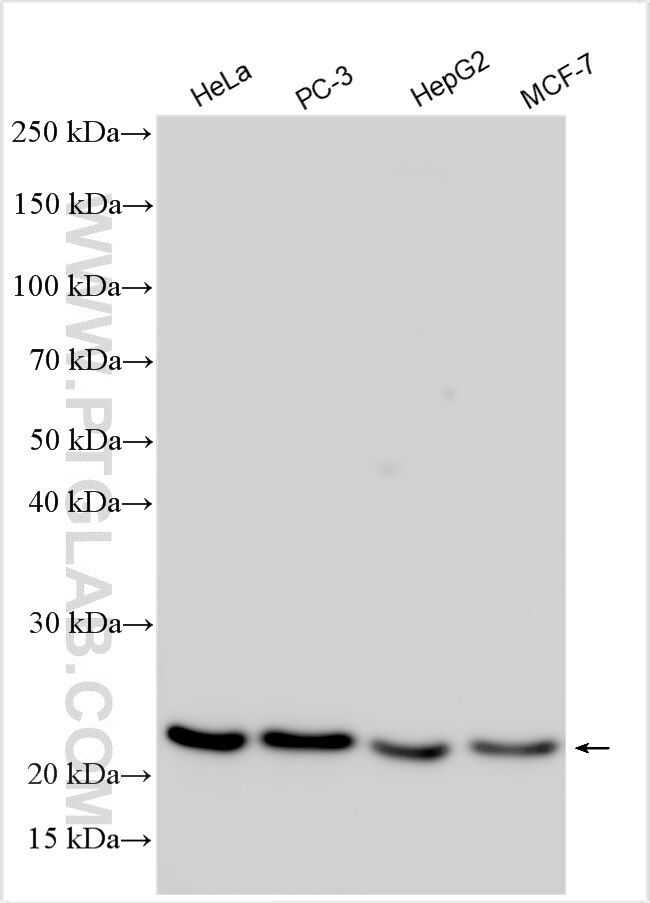ZCCHC13 Polyklonaler Antikörper
ZCCHC13 Polyklonal Antikörper für WB, ELISA
Wirt / Isotyp
Kaninchen / IgG
Getestete Reaktivität
human, Maus, Ratte
Anwendung
WB, ELISA
Konjugation
Unkonjugiert
Kat-Nr. : 26023-1-AP
Synonyme
Galerie der Validierungsdaten
Geprüfte Anwendungen
| Erfolgreiche Detektion in WB | HeLa-Zellen, HepG2-Zellen, MCF-7-Zellen, PC-3-Zellen |
Empfohlene Verdünnung
| Anwendung | Verdünnung |
|---|---|
| Western Blot (WB) | WB : 1:500-1:2000 |
| It is recommended that this reagent should be titrated in each testing system to obtain optimal results. | |
| Sample-dependent, check data in validation data gallery | |
Produktinformation
26023-1-AP bindet in WB, ELISA ZCCHC13 und zeigt Reaktivität mit human, Maus, Ratten
| Getestete Reaktivität | human, Maus, Ratte |
| Wirt / Isotyp | Kaninchen / IgG |
| Klonalität | Polyklonal |
| Typ | Antikörper |
| Immunogen | ZCCHC13 fusion protein Ag22050 |
| Vollständiger Name | zinc finger, CCHC domain containing 13 |
| Berechnetes Molekulargewicht | 166 aa, 18 kDa |
| Beobachtetes Molekulargewicht | 25 kDa |
| GenBank-Zugangsnummer | BC021176 |
| Gene symbol | ZCCHC13 |
| Gene ID (NCBI) | 389874 |
| Konjugation | Unkonjugiert |
| Form | Liquid |
| Reinigungsmethode | Antigen-Affinitätsreinigung |
| Lagerungspuffer | PBS mit 0.02% Natriumazid und 50% Glycerin pH 7.3. |
| Lagerungsbedingungen | Bei -20°C lagern. Nach dem Versand ein Jahr lang stabil Aliquotieren ist bei -20oC Lagerung nicht notwendig. 20ul Größen enthalten 0,1% BSA. |
Hintergrundinformationen
ZCCHC13 (zinc-finger CCHC-type containing 13) is a member of a family of zinc-finger CCHC-type containing DNA/RNA-binding proteins that are involved in mRNA transcription and protein translation. Downregulation of ZCCHC13 was shown to be associated with spermatogenesis failure in patients with non-obstructive azoospermia (NOA)(PMID: 29531833). It is reported that ZCCHC13 overexpression might be related to global DNA hypomethylation and promote hepatocellular carcinoma (HCC)(PMID: 23891108).
Protokolle
| Produktspezifische Protokolle | |
|---|---|
| WB protocol for ZCCHC13 antibody 26023-1-AP | Protokoll herunterladen |
| Standard-Protokolle | |
|---|---|
| Klicken Sie hier, um unsere Standardprotokolle anzuzeigen |


